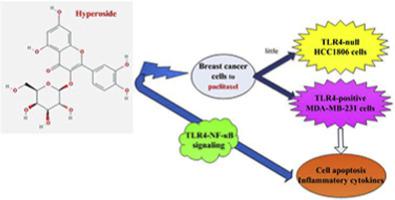当前位置:
X-MOL 学术
›
Mol. Cell. Probes
›
论文详情
Our official English website, www.x-mol.net, welcomes your
feedback! (Note: you will need to create a separate account there.)
Administration with hyperoside sensitizes breast cancer cells to paclitaxel by blocking the TLR4 signaling.
Molecular and Cellular Probes ( IF 2.3 ) Pub Date : 2020-05-22 , DOI: 10.1016/j.mcp.2020.101602 Ting Sun 1 , Yunyong Liu 2 , Mengdan Li 2 , Huihui Yu 2 , Haozhe Piao 3
Molecular and Cellular Probes ( IF 2.3 ) Pub Date : 2020-05-22 , DOI: 10.1016/j.mcp.2020.101602 Ting Sun 1 , Yunyong Liu 2 , Mengdan Li 2 , Huihui Yu 2 , Haozhe Piao 3
Affiliation

|
Breast cancer is a malignancy and one of the most frequent causes of cancer death among women worldwide. Paclitaxel is a common chemotherapeutic drug and has recently been shown to facilitate tumor cell escape during cytotoxic chemotherapy by inducing inflammatory mediators and pro-survival protein expression. Hyperoside is a flavonoid glycoside compound and exerts anti-inflammation, and anti-tumor growth properties. However, its function in breast cancer chemosensitivity remains poorly elucidated. In this study, hyperoside exhibited little cytotoxicity to normal human breast mammary epithelial cell lines, and also protected against paclitaxel-induced cytotoxicity in MCF-10A. Importantly, treatment with hyperoside engendered not only inhibition of cell viability, but also potentiated cancer cell sensitivity to paclitaxel in TLR4-positive breast cancer MDA-MB-231 cells by suppressing cell viability, and increasing cell apoptosis and caspase-3 activity. Nevertheless, although hyperoside exposure restrained cell viability, its treatment presented little effects to paclitaxel sensitivity in TLR4-null HCC1806 cells. Intriguingly, paclitaxel stimulation activated the TLR4-NF-κB signaling, which was reversed after hyperoside administration. Concomitantly, hyperoside also attenuated paclitaxel-mediated anti-apoptotic Bcl-2 expression, but enhanced the effects of paclitaxel on pro-apoptotic Bax expression, and pro-inflammatory cytokine IL-6 and IL-6 levels in MDA-MB-231 cells. Importantly, restoring the TLR4 pathway overturned hyperoside-evoked chemosensitivity to paclitaxel in MDA-MB-231 cells. Thus, hyperoside may elevate breast cancer cell sensitivity to paclitaxel by blocking TLR4 activation-mediated pro-inflammatory and pro-survival approaches, thereby endorsing its usefulness as a promising therapeutic combination to overcome chemosensitivity in breast cancer.
中文翻译:

高丝皂苷的给药通过阻断TLR4信号传导使乳腺癌细胞对紫杉醇敏感。
乳腺癌是一种恶性肿瘤,是全世界女性中最常见的癌症死亡原因之一。紫杉醇是一种常见的化学治疗药物,最近已显示出通过诱导炎症介质和促存活蛋白的表达,在细胞毒性化疗过程中促进肿瘤细胞逃逸。金丝桃苷是一种类黄酮糖苷化合物,具有抗发炎和抗肿瘤生长的特性。但是,其在乳腺癌化学敏感性中的功能仍然不清楚。在这项研究中,高丝皂苷对正常人的乳房乳腺上皮细胞系几乎没有细胞毒性,并且还可以防止紫杉醇在MCF-10A中诱导的细胞毒性。重要的是,用高丝皂苷治疗不仅可以抑制细胞活力,通过抑制细胞活力,增加细胞凋亡和caspase-3活性,还增强了TLR4阳性乳腺癌MDA-MB-231细胞对紫杉醇的癌细胞敏感性。尽管如此,尽管高脂苷暴露抑制了细胞活力,但在TLR4空HCC1806细胞中,其处理对紫杉醇敏感性的影响很小。有趣的是,紫杉醇刺激激活了TLR4-NF-κB信号传导,在高丝苷给药后这一信号被逆转。同时,高丝皂苷还减弱了紫杉醇介导的抗凋亡Bcl-2表达,但增强了紫杉醇对MDA-MB-231细胞中促凋亡Bax表达以及促炎性细胞因子IL-6和IL-6水平的影响。重要的是,在MDA-MB-231细胞中,恢复TLR4途径可推翻高侧苷对紫杉醇的化学敏感性。从而,
更新日期:2020-05-22
中文翻译:

高丝皂苷的给药通过阻断TLR4信号传导使乳腺癌细胞对紫杉醇敏感。
乳腺癌是一种恶性肿瘤,是全世界女性中最常见的癌症死亡原因之一。紫杉醇是一种常见的化学治疗药物,最近已显示出通过诱导炎症介质和促存活蛋白的表达,在细胞毒性化疗过程中促进肿瘤细胞逃逸。金丝桃苷是一种类黄酮糖苷化合物,具有抗发炎和抗肿瘤生长的特性。但是,其在乳腺癌化学敏感性中的功能仍然不清楚。在这项研究中,高丝皂苷对正常人的乳房乳腺上皮细胞系几乎没有细胞毒性,并且还可以防止紫杉醇在MCF-10A中诱导的细胞毒性。重要的是,用高丝皂苷治疗不仅可以抑制细胞活力,通过抑制细胞活力,增加细胞凋亡和caspase-3活性,还增强了TLR4阳性乳腺癌MDA-MB-231细胞对紫杉醇的癌细胞敏感性。尽管如此,尽管高脂苷暴露抑制了细胞活力,但在TLR4空HCC1806细胞中,其处理对紫杉醇敏感性的影响很小。有趣的是,紫杉醇刺激激活了TLR4-NF-κB信号传导,在高丝苷给药后这一信号被逆转。同时,高丝皂苷还减弱了紫杉醇介导的抗凋亡Bcl-2表达,但增强了紫杉醇对MDA-MB-231细胞中促凋亡Bax表达以及促炎性细胞因子IL-6和IL-6水平的影响。重要的是,在MDA-MB-231细胞中,恢复TLR4途径可推翻高侧苷对紫杉醇的化学敏感性。从而,











































 京公网安备 11010802027423号
京公网安备 11010802027423号